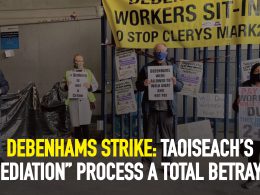It really is an extraordinary situation. You have a national public transport company – Bus Eireann. It is in the ownership of the State. It provides a really essential service in linking up our cities, towns and rural villages and delivering thousands of children to schools every day. It ventures into parts of Ireland where no private bus company would go because it is not profitable. But now the Government declares that the company will crash unless it cannibalises €5 million from the wages of its drivers and ancillary staff.
Deloitte is the second largest multinational in the world in the field of consulting, enterprise risk and financial advisory services. Not a hotbed of socialists then. In a report on Bus Eireann in 2009 it found, ‘scheduling of buses and drivers to be efficient when the nature of each service was taken into account.’ It also found that , ‘government public service obligation(PSO), including capital payments . . . are relatively low.’ Using figures from 2007 it found Bus Eireann received €36.6 million in subventions which was 12.9% of total revenue. By contrast the subvention to the national bus services in the Netherlands was 49%, Switzerland 51% and Walloonia in Belgium 78%.
This is the real story that should be highlighted. Public transport services are highly subsidised in the advanced EU States but this State has lagged behind pathetically. On top of that the public bus service has been consistently undermined by pro privatisation policies driven by both the EU and successive Irish governments.
Speaking in the Dail on Wednesday, Minister of State at the Department of Transport, Alan Kelly, said, ‘Bus Éireann operates three different types of service. The school bus service is operated on a cost recovery basis. The public service obligation, PSO, services are subsidised by the State on the basis that they are badly needed in areas which would not otherwise have a service. As the Expressway services are subject to competition, the State is legally precluded from subsidising them and could not throw money at them, even if it had additional funding available.’
The Expressway services which run between the main cities carry most passengers. Private operators have been given licences for these routes in competition with the public bus company. Many of these employ drivers and other workers on very low wages if not on the bare minimum wage. They then set out to undercut Bus Eireann with lower fares. But EU pro privatisation rules prohibit subsidisation. The logic of the capitalist market, therefore, is that the wages and conditions of Bus Eireann workers must be driven down to compete with the low wage operators.
Bus Eireann drivers are victims of the brutal ‘race to the bottom’ scenario. They are modestly paid workers who depend on overtime and unsocial hours payments to bring them up to a more reasonable level. They do a very difficult and highly responsible job. A single lapse of concentration or an error of judgement could have disastrous consequences. Yet this cohort of workers have been subjected to relentless bullying over the last week in response to their absolutely correct refusal to accept wage cuts that would amount to €3,000 a year or over. Government Ministers, business organisations and editorial writers in the billionaire owned press have all ganged up to demand that they accept the cuts, ruling out proper subsidisation. Many of these forces defend the transfer of billions of public funding to pay the private gambling losses of European bankers and bondholders.
During the Christmas before last, Bus Eireann workers gave the country a lesson on what public service means. Tens of thousands of emigrants, returning from around the world to be with their loved ones for the holiday season, were chronically delayed by catastrophic weather conditions. Bus drivers left homes and families to bring them home all over the country on Christmas Day itself. How quickly an establishment wedded to the heartless values of the capitalist market forgets!
Bus Eireann workers suspended their strike on Tuesday while talks commenced at the Labour Relations Commission. Proposals have now emerged but they add insult to injury. For cynical cosmetic reasons the Chief Executive’s salary would go down minimally by €5,000 from €189,000 but the drivers on a quarter of this salary would still lose substantially. The workers should reject them out of hand. They should be supported by the ranks of the trade unions generally. They should be supported by the passengers who depend on them providing a safe and reliable service.
Public transport is an integral part of society’s infrastructure. Like the Health Service, it cannot be left to the laws of the capitalist markets. It must be subsidised properly and that subsidy must ensure that those who provide the service are justly rewarded with a reasonable wage and safe working conditions.











